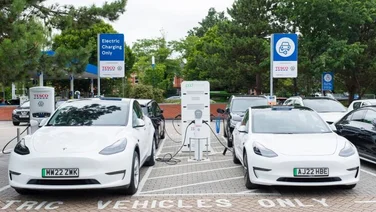Chancellor, Jeremy Hunt, presented the Government’s Spring 2024 budget to Parliament today, but it contained only a few mentions of measures to help with the UK’s net zero transition.
Among them was the allocation of £160 million for two nuclear sites, as well £120 million to develop technologies for offshore windfarms and carbon capture. Windfall tax on North Sea oil and gas companies will also be extended by a year.
Other key changes announced in the new budget include:
- A 2p cut to national insurance tax
- A reduction to the higher rate of property gains tax from 28% to 24%
- Abolishing non-dom tax status and replacing it with a “fairer” system from April 2025
- An extension of the freeze on alcohol and fuel duty
- A “public sector productivity plan” for the NHS, due to be published later today
The announcement will likely come as a disappointment to many environmentalists, who were hoping for more of a boost to the UK’s net zero transition.

Among them is NGO Greenpeace, who published a list of budget recommendations, centred around tax reform and public investment, ahead of the budget announcement.
Greenpeace argued that the wealthiest individuals and big corporations are the biggest polluters, and should therefore help pay for the green transition through higher taxes.
The organisation’s proposed tax reforms include:
- Equalising capital gains with income tax rates, which could raise up to £15.2 billion a year
- Increasing the tax rate for fossil fuel companies to a minimum of 70%
- Introducing a frequent flyer levy, “with an escalating charge applied to each flight over a one-year period”
According to Greenpeace, the money raised from these tax reforms should be used to “support households and workers with the net zero transition”.
This could come in the form of more grants for energy efficient home improvements, to help low income families with the cost of upgrading insulation, or installing low-carbon heating, such as heat pumps.
Greenpeace is also encouraging the government to borrow more in order to boost public investment in creating a green economy, which they argue will encourage private investment.
The government has so far been very adverse to borrowing and increasing the national debt, with the Chancellor boasting that the UK has “the second lowest level of government debt in the G7” in his speech to parliament today.
Even the Labour Party has had to axe their £28 billion a year green spending promise, after the Tories heavily criticised the plan for the large amount of borrowing it would require.
However, a lack of public investment in the green transition, Greenpeace argued, has led to a stagnation of economic growth, which will cost taxpayers, businesses and the Government more in the long term.
One example Greenpeace gives is that the UK still has some of the most poorly insulated homes in Europe.
While some EU countries have already hit their 2030 targets for home insulation, a report by the charity National Energy Action (NEA) found that millions of UK households would still be energy inefficient by 2030 without increased government support.
The Energy and Climate Intelligence Unit (ECIU), also published a report earlier this year, which found that failures to ramp up Net Zero tech had cost households an extra £1,900 a year on their energy bills.

So why is the UK falling behind when it comes to net zero? Well, an analysis by Greenpeace of data from the International Energy Agency found that the UK spends the least on low-carbon energy policies of any major European economy.
Commenting on the findings to The Guardian, Bob Ward, the policy and communications director at the Grantham Research Institute on Climate Change and the Environment at the London School of Economics (LSE) said:
“This low investment explains why productivity has stagnated in the UK and growth has been so feeble. It also explains why our homes and businesses are vulnerable to climate change impacts, our countryside and seas are becoming depleted of wildlife, our cities have dirty air, and our rivers and beaches are covered in sewage.”
LSE published a report in February 2024 arguing that the UK should be investing £26 billion a year into creating a green economy, and lower energy bills.
Calls for more public investment in a green economy are increasing.
Ahead of the budget announcement, green industrialist Dale Vince, founder of Ecotricity, a green energy supplier, called on the government to cap the price of North Sea gas, lift a ban on onshore wind farms, and reinstate a zero carbon standard for new home builds, among other measures.
He claims these policy changes could save households in Britain £10 billion a year on energy bills.
On top of this, several car manufacturers and energy suppliers, including Jaguar Land Rover and E.ON Energy, signed a letter this week demanding that the Chancellor reduce the tax rate on electric vehicle (EV) public charge points.
The VAT rate at public charge points is 20%, compared to 5% for home charging, which means that charging an EV in public costs almost twice as much as charging at home.
The letter to the Chancellor states that the higher tax rate is disadvantageous to nearly two fifths of electric car owners, who don’t have the option of installing an EV home charger.
Dev Chana, the managing director of E.ON Drive Infrastructure, told The Times that higher VAT on public charging was “effectively a tax on people who don’t have a driveway”.
The lack of public support for purchasing EVs amidst the cost of living crisis was recently reflected in the fact that EV sales to private buyers slumped at the start of 2024.






